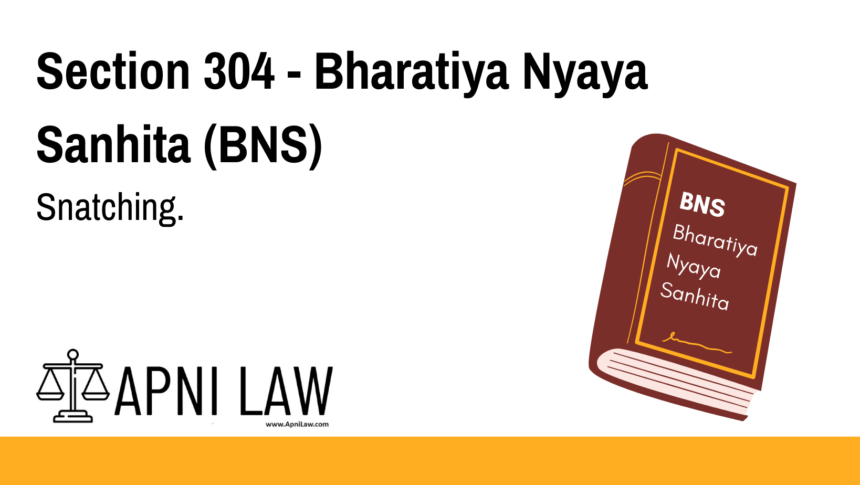Code: Section 304 BNS
(1) Theft is snatching if, in order to commit theft, the offender suddenly or quickly
or forcibly seizes or secures or grabs or takes away from any person or from his possession
any movable property.
(2) Whoever commits snatching, shall be punished with imprisonment of either
description for a term which may extend to three years, and shall also be liable to fine.
Explanation of Section 304 BNS
Section 304 of the Bharatiya Nyaya Sanhita (BNS) defines snatching as a specific type of theft where the offender uses sudden or forceful methods to seize movable property from another person. This includes grabbing items quickly, pulling them away, or using any form of force to take possession.
The law prescribes a punishment of up to three years of imprisonment, a fine, or both. This reflects the serious nature of the offense, especially considering the potential harm or distress it may cause the victim.
Illustration
Example 1: Street Snatching
A person walking down the street has their handbag snatched by another individual who runs past them and grabs the bag forcefully. This act qualifies as snatching under Section 304 BNS, and the offender can be punished with imprisonment and/or a fine.
Example 2: Snatching in a Market
In a crowded marketplace, an individual grabs a mobile phone from another person’s hand and quickly runs away. The use of sudden force to seize the phone makes this an offense of snatching under Section 304 BNS.
Common Questions and Answers on Section 304 BNS
1. What is considered snatching under Section 304?
- Answer: Snatching involves the sudden, quick, or forceful seizure of movable property from another person, often in public places or situations where the victim is caught off guard.
2. What kind of punishment can a person face for snatching?
- Answer: The offender can face up to three years of imprisonment, a fine, or both.
3. Is snatching different from regular theft?
- Answer: Yes, snatching involves the use of force or suddenness to take property directly from a person, whereas theft may not involve such immediate or forceful confrontation.
4. Can snatching occur without physical contact?
- Answer: No, snatching requires physical contact, as it involves forcefully grabbing or seizing property from another person’s possession.
Conclusion
Section 304 of the BNS addresses the crime of snatching, emphasizing the use of sudden or forceful means to commit theft. The law provides for strict penalties to deter such crimes, recognizing the distress and harm they cause to victims. Understanding the legal framework around snatching helps both the public and law enforcement to address and prevent such offenses effectively.








